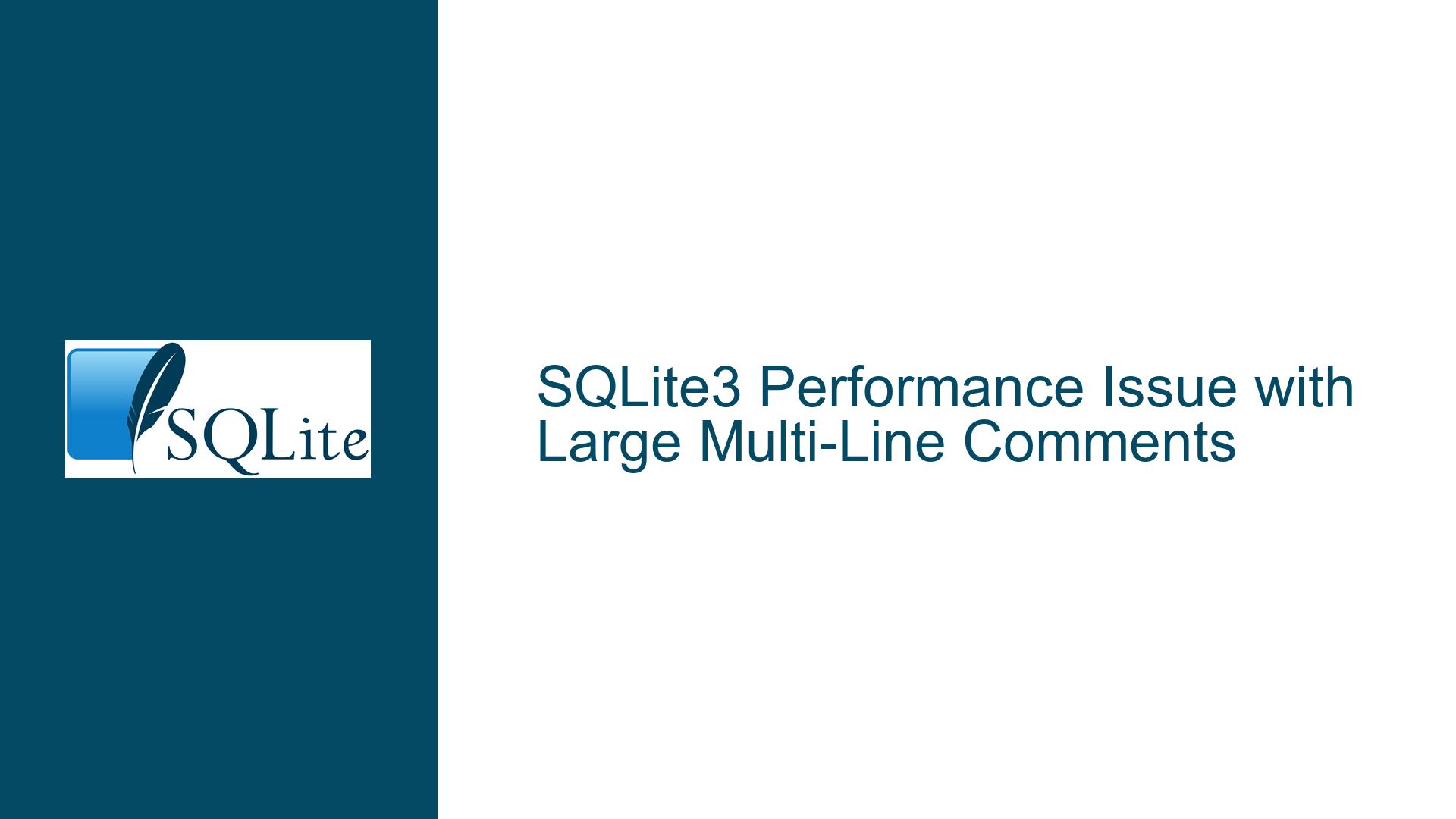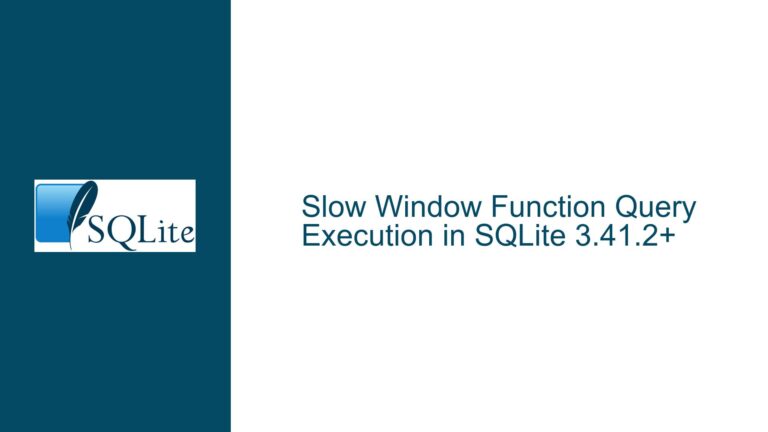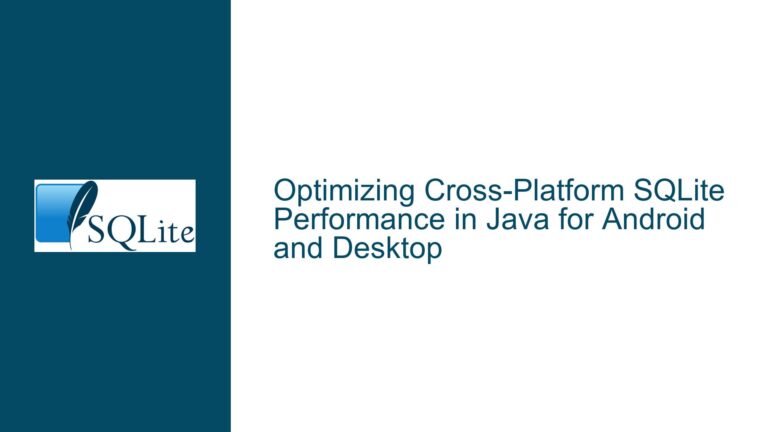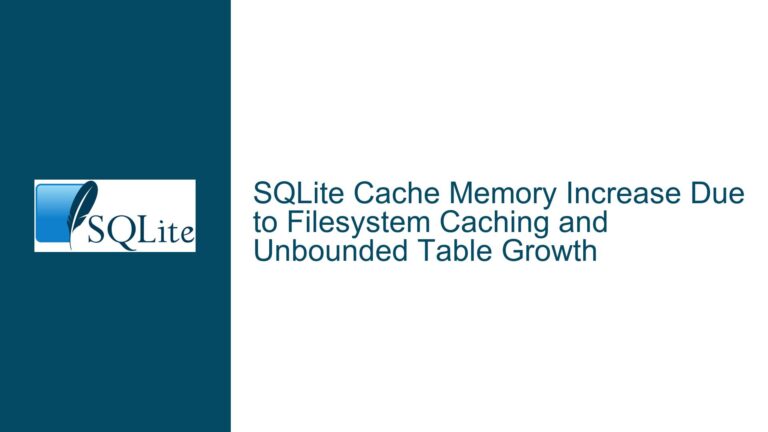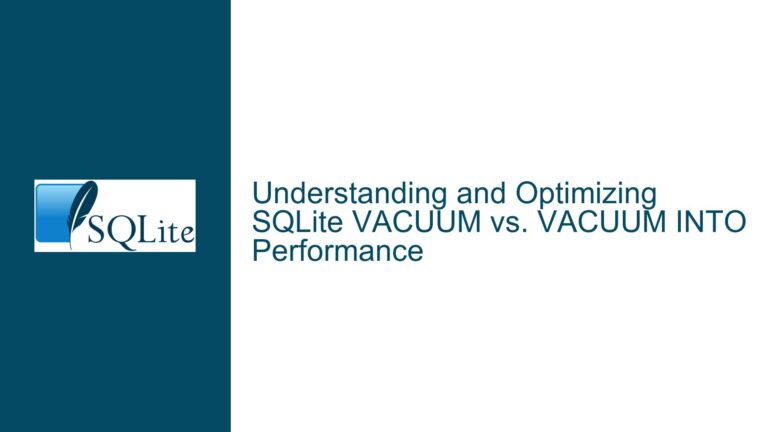SQLite3 Performance Issue with Large Multi-Line Comments
Understanding the Performance Bottleneck in SQLite3 with Large Multi-Line Comments
SQLite3 is a lightweight, embedded SQL database engine known for its simplicity, efficiency, and reliability. However, like any software, it has its limitations and edge cases. One such edge case involves the handling of large multi-line comments within SQL scripts. This issue can lead to significant performance degradation, especially when dealing with extremely large comment blocks. Below, we will explore the root causes of this performance bottleneck, the underlying mechanisms in SQLite3 that contribute to it, and potential solutions or workarounds to mitigate the problem.
The Role of Multi-Line Comments in SQLite3 Performance Degradation
Multi-line comments in SQLite3 are enclosed within /* and */ delimiters. These comments are ignored by the SQLite parser during execution, but the process of identifying and skipping them is not without cost. When a SQL script contains a large multi-line comment block, the SQLite3 command-line interface (CLI) must read and process each line of the comment before it can proceed to execute the actual SQL statements. This processing overhead becomes particularly pronounced when the comment block spans tens or hundreds of thousands of lines.
The performance bottleneck arises from two primary factors:
Memory Reallocation Overhead: As the SQLite3 CLI reads each line of the multi-line comment, it appends the line to an internal buffer. This buffer is dynamically resized using the
reallocfunction, which can be computationally expensive, especially when the buffer grows significantly. The repeated reallocation of memory for the buffer contributes to the O(n^2) time complexity observed in this scenario.Semicolon-Terminated Line Checks: SQLite3 checks whether each line of input ends with a semicolon (
;) to determine if it represents a complete SQL statement. This check is performed even for lines within multi-line comments. When a comment block contains thousands of lines, each line must be scanned for the presence of a semicolon, further exacerbating the performance issue.
These factors combine to create a situation where the processing time for large multi-line comments grows quadratically with the number of comment lines. This behavior is particularly problematic for users who generate SQL scripts programmatically, as these scripts may include extensive comment blocks for documentation or debugging purposes.
Potential Causes of the Performance Bottleneck
The performance bottleneck in SQLite3 when handling large multi-line comments can be attributed to several underlying causes:
Inefficient Buffer Management: The SQLite3 CLI uses a dynamic buffer to accumulate SQL input lines. As each line is read, the buffer is resized using
realloc, which involves copying the existing buffer contents to a new memory location. This process becomes increasingly inefficient as the buffer grows, leading to significant overhead.Redundant Semicolon Checks: The SQLite3 CLI checks each input line for the presence of a semicolon, even when the line is part of a multi-line comment. This check is unnecessary for comment lines, as they are ignored during execution. However, the CLI does not distinguish between comment lines and SQL statement lines, resulting in redundant processing.
Lack of Comment-Specific Optimization: The SQLite3 CLI does not include specific optimizations for handling large multi-line comments. For example, it does not skip or discard comment lines immediately upon detection, but instead processes them as part of the input buffer. This lack of optimization contributes to the overall performance degradation.
Complexity of SQL Parsing: SQLite3’s parsing logic is designed to handle a wide range of SQL syntax, including nested comments, string literals, and other edge cases. This complexity makes it challenging to implement optimizations for specific scenarios, such as large multi-line comments, without introducing new bugs or breaking existing functionality.
Troubleshooting Steps, Solutions, and Fixes
To address the performance bottleneck associated with large multi-line comments in SQLite3, several approaches can be considered. These range from modifying the SQLite3 CLI source code to adopting alternative strategies for handling comments in SQL scripts.
Optimize Buffer Management in the SQLite3 CLI:
One potential solution is to modify the buffer management logic in the SQLite3 CLI to reduce the overhead of memory reallocation. For example, the buffer size could be increased more aggressively, using a geometric growth strategy (e.g., doubling the buffer size each time it needs to be resized). This approach would reduce the number ofrealloccalls and improve overall performance.A specific change to the SQLite3 CLI source code could involve updating the line in
shell.cthat calculates the new buffer size. For instance, replacing:nAlloc = nSql + nLine + 100;with:
nAlloc = 3 * (nSql + nLine) / 2 + 100;would result in a more efficient buffer growth strategy. However, as noted in the discussion, this change alone may not fully eliminate the O(n^2) behavior, as other factors (such as semicolon checks) also contribute to the performance bottleneck.
Skip Semicolon Checks for Comment Lines:
Another potential optimization is to skip the semicolon check for lines that are part of a multi-line comment. This would require modifying the SQLite3 CLI to track whether it is currently processing a comment block and avoid unnecessary checks for comment lines. Implementing this optimization would reduce the computational overhead associated with large comment blocks.However, this approach introduces additional complexity, as the CLI would need to accurately detect the start and end of multi-line comments. This could be challenging in cases where comments are nested or contain string literals that resemble comment delimiters.
Preprocess SQL Scripts to Remove Comments:
A practical workaround for users experiencing performance issues with large multi-line comments is to preprocess their SQL scripts to remove or reduce the size of comment blocks before passing them to the SQLite3 CLI. This can be done using a simple script or tool that scans the SQL file and strips out comments.For example, a Perl script could be used to remove multi-line comments:
#!/usr/bin/perl while (<>) { s/\/\*.*?\*\///gs; # Remove multi-line comments print; }This script reads the input SQL file, removes all multi-line comments, and prints the result. The output can then be piped directly into the SQLite3 CLI for execution.
Use Single-Line Comments Instead of Multi-Line Comments:
Another strategy is to replace multi-line comments with single-line comments (using--). Single-line comments are generally easier for the SQLite3 CLI to process, as they do not require tracking the start and end of a comment block. This approach can significantly reduce the performance overhead associated with large comment blocks.For example, instead of:
/* This is a multi-line comment that spans multiple lines. */use:
-- This is a single-line comment. -- It spans multiple lines, but each line is independent.Upgrade to a Newer Version of SQLite3:
The SQLite development team is actively working on improving the performance of the CLI, including optimizations for handling large multi-line comments. Users experiencing performance issues should consider upgrading to the latest version of SQLite3, as it may include fixes or enhancements that address this problem.For example, the
speedy-clibranch mentioned in the discussion introduces significant performance improvements for handling large comment blocks. Users can experiment with this branch to determine if it resolves their specific performance issues.Avoid Large Comment Blocks in Generated SQL Scripts:
Finally, users who generate SQL scripts programmatically should consider minimizing the size of comment blocks in their output. This can be achieved by limiting the amount of documentation or debugging information included in the comments or by storing this information in a separate file.For example, instead of embedding a large comment block directly in the SQL script, the script could reference an external documentation file:
-- Documentation for this script can be found in doc.txt.
By implementing one or more of these solutions, users can mitigate the performance bottleneck associated with large multi-line comments in SQLite3 and improve the overall efficiency of their SQL script processing.
